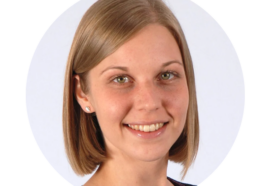In this Papers Podcast, Dr. Emma James discusses her JCPP Advances paper ‘Heterogeneity in children’s reading comprehension difficulties: A latent class approach’ (doi.org/10.1002/jcv2.12177). Emma is the lead author of the paper.
There is an overview of the paper, methodology, key findings, and implications for practice.
Discussion points include:
- A definition of ‘word reading’ and ‘comprehension’.
- The main research questions they set out to address.
- Insight into the data set used (The Avon Longitudinal Study of Parents and Children).
- The impact of the findings for researchers, and practitioners.
- Advice for teachers and parents based on the study.
In this series, we speak to authors of papers published in one of ACAMH’s three journals. These are The Journal of Child Psychology and Psychiatry (JCPP); The Child and Adolescent Mental Health (CAMH) journal; and JCPP Advances.
Subscribe to ACAMH mental health podcasts on your preferred streaming platform. Just search for ACAMH on; SoundCloud, Spotify, CastBox, Deezer, Google Podcasts, Podcastaddict, JioSaavn, Listen notes, Radio Public, and Radio.com (not available in the EU). Plus we are on Apple Podcasts visit the link or click on the icon, or scan the QR code.

Emma is a Lecturer in Psychology at the University of York. Her research concerns language learning and literacy development, using both experimental methods and secondary data analysis. Her current project analyses data from a large-scale dataset to understand why some children struggle to understand what they read, and the implications it might have for broader life outcomes.
Transcript
[00:00:00.080] Mark Tebbs: Hello, and welcome to the Papers Podcast Series for the Association for Child and Adolescent Mental Health, of ACAMH for short. I’m Mark Tebbs, and I’m a Freelance Consultant. In this series, we speak to authors of papers published in one of ACAMH’s three journals. These are the Journal of Child Psychology and Psychiatry, commonly known as JCPP, the Child and Adolescent Mental Health, known as CAMH, and JCPP Advances. If you’re a fan of our Papers Podcast series, please subscribe on your preferred platform, let us know how we did, with a rating or review, and do share with friends and colleagues.
Today, I’m delighted to be interviewing Emma James, who is the lead author, with Paul Thompson, Lucy Bowes and Kate Nation, of a paper entitled “Heterogeneity in Children’s Reading Comprehension Difficulties: A latent class approach,” recently published in JCPP Advances. Emma, thank you for joining me, I’m really looking forward to our conversation today.
[00:01:01.960] Dr. Emma James: Oh, me, too, thank you very much for having me.
[00:01:05.880] Mark Tebbs: So, let’s start with some introductions. Could you just say maybe a little bit about who you are and a brief overview of your, kind of, career and work to date?
[00:01:14.570] Dr. Emma James: Sure, so I’m a Lecturer at the University of York, and my background is in psychology. So, I studied experimental psychology, at Oxford, for my undergraduate degree, and went on to do a masters and PhD at the University of York. And then I, kind of, yo-yoed a bit between Oxford and York since. So, the project I’m talking about today was conducted within the ReadOxford Research Group, led by Professor Kate Nation.
[00:01:39.190] Mark Tebbs: Excellent, so what got you interested in children’s reading comprehension difficulties?
[00:01:44.670] Dr. Emma James: Well, I always loved reading as a child, and the ability to read is such a fundamental part of how we engage with society. And I think the more I learned about the science of reading, the more I came to appreciate that it’s not necessarily an ability that we should take for granted. So, I think as a population we have quite a good awareness of dyslexia, so individuals who struggle to, kind of, translate the letters on the page into spoken language. But there are some children who seem to do just fine at that part, but are struggling to understand what they read. And I think those difficulties are perhaps less noticeable in developing readers and so they’re probably less likely to receive support. So, I think I just became interested in finding out more about this group, really so that we can better support them in the classroom.
[00:02:30.780] Mark Tebbs: Brilliant, and that’s really interesting. So, let’s turn to the study then, could you just give us a little bit of an overview of the study? And it would be really useful in that overview if you could just pick out if there’s any, sort of, technical terms or definitions that would make it, kind of, easier for the listeners to understand.
[00:02:46.500] Dr. Emma James: Okay, so, yes, we analysed data from over 6,800 children to look at different types of reading difficulty and how they might relate to other cognitive skills, what might the reasons be, perhaps, for those different types of reading difficulties? So, I’ll be talking about differences in word reading, so essentially the ability to read accurately, and also learn about differences in comprehension, the ones we’re most interested in. So, that’s our ability to understand spoken and written language.
And then in terms of other cognitive skills, we also looked at vocabulary, so word knowledge, and we looked at non-verbal IQ tests. So, those are the IQ tests that, kind of, capture visual problem solving and reasoning. And then, aside from that, we also looked at the ability to pay attention and working memory, so that’s the ability to hold and manipulate information in short-term memory.
[00:03:34.420] Mark Tebbs: Great stuff, so when you were setting out with the study, what were the, kind of, main research questions you were trying to address?
[00:03:42.180] Dr. Emma James: So, our first research question really set out just to identify those different types of readers in this large-scale dataset. So, do we find different groups of children who have either weaknesses in word reading, so similar to a dyslexic profile, and then those that might have specific difficulties with comprehension, or perhaps both of those different elements of reading. And then our second research question wanted to focus more on those children with the comprehension difficulties. So, might there be subgroups of them who struggle with their comprehension, perhaps for different reasons?
[00:04:15.450] Mark Tebbs: So, you’ve mentioned a couple of times the, kind of, the dataset, so could you just say a little bit more? ‘Cause I think you use the big birth dataset, don’t you? Could you explain that to the listeners, please?
[00:04:24.860] Dr. Emma James: Yeah, so we used a dataset called ALSPAC, which stands for the “Avon Longitudinal Study of Parents and Children,” and it’s also known then, kind of, in the participant community, as the “Childrens of the 90s.” So, this is a study that’s based in Bristol, and it started when Researchers in the area recruited over 14,500 pregnant women in the early 1990s, and they’ve been following the children’s development ever since. So, the children are now in their early 30s, I’m one of the participants of the dataset myself, and they’re still following and collecting data on those children as they’ve grown up now. So, yes, we gained permission from the study to analyse some of the reading data for this particular project.
[00:05:05.759] Mark Tebbs: Okay, so it’s, kind of, it’s personal as well as professional.
[00:05:09.580] Dr. Emma James: Yeah, exactly.
[00:05:11.210] Mark Tebbs: So, thinking then a little bit about the methodology, so there’s a, kind of, data driven approach. Could you describe what methodology you used in the study, and maybe a little bit about whether there are any, kind of, methodological challenges that you needed to overcome.
[00:05:27.259] Dr. Emma James: Yeah, so a traditional approach to studying reading disorders is to look at assessments of reading, different types of reading, different components of reading, and then we’d decide on a threshold that would identify a child as having some kind of impairment. So, we might decide that a child that scores below 85, on a reading comprehension assessment, but above 90 or 95 on a word reading accuracy task, might meet our criteria for having specific comprehension problems. But those thresholds are really quire arbitrary, and in practice, we wouldn’t really be drawing such sharp distinctions between a child who scores 85 on a test and a child who scores 86. So, really, there’s this kind of mismatch between the questions we ask about groups in research, and then what we want to know about individual children in practice.
So, in this study, with this large dataset, instead of imposing the criteria ourselves, we used a statistical technique that looks for possible subgroups in the data. So, the analysis essentially identifies groups of children that perform more similarly to each other on a set of tasks, and then more differently to other groups in the dataset. So, with this large dataset, we can see what patterns exist in the data without having to, sort of, enforce those criteria ourselves.
[00:06:45.650] Mark Tebbs: Okay, so what were the results that came out of that, kind of, different way of approaching the data?
[00:06:53.650] Dr. Emma James: Our first major finding was really that children who have significant reading problems are struggling with both the word reading and the comprehension aspects of reading. So, we didn’t find a group of children with good word reading, but poor comprehension skills, and perhaps even more surprisingly we also didn’t find the group with, kind of, specific word reading problems, but otherwise good comprehension. So, that, kind of, classic dyslexic profile that’s sometimes studied in the literature. So, this was really quite different from our initial expectations. These groups have traditionally been, kind of, pulled apart and studied separately.
But we did see that comprehension was entirely accounted for by word reading skills. So, we ran a second analysis that identified a group of children who had weaker comprehension than you’d expect based on how well they were reading. So, I think the key difference between this group and those that have been, kind of, studied in this cut-off approach is that they spanned that whole spectrum of reading ability. So, they’re not just an isolated, kind of, category at the bottom of the spectrum. So, kids who have relatively weak comprehension.
[00:07:56.180] Mark Tebbs: And what else did you find?
[00:07:58.620] Dr. Emma James: So, we then took this group of kids who had relatively weak comprehension and we looked at their cognitive skills. So, might there be different reasons why some of them struggle? Because comprehension is a really complex skill, not really a skill in itself, but lots of skills working together. So, using this data driven approach, again, we found two subgroups.
So, the majority of them, they still performed within the average range of reading ability, so we wouldn’t traditionally consider them as, kind of, having a reading impairment, but their comprehension was weaker than their word reading. And they also showed then similar weaknesses in vocabulary and in non-verbal IQ. So, this mapped quite closely to some of that past research.
But then there were a smaller group of children, around 19% of them, who had more severe reading problems, but they had broad difficulties across the range of cognitive assessments that we looked at. So, like the other group, they had weaknesses in vocabulary and non-verbal IQ, but they also had weaknesses in working memory, and showed, sort of, more symptoms of an inattention and hyperactivity as well. So, quite a broad range of difficulties.
[00:09:03.130] Mark Tebbs: Okay, so what’s the implications of this, maybe starting with a research perspective? How does this impact on the, kind of, research field?
[00:09:10.990] Dr. Emma James: I think our findings, kind of, move us away from this approach that we should be selecting and studying small groups of children based on really restrictive criteria. So, especially in the case of reading comprehension difficulties, we don’t see that there’s this distinct category that we were, kind of, marking out by imposing our criteria before.
But I think our second question also highlighted that those comprehension problems don’t reflect, kind of, a single core difficulty. We know that language is important for comprehension, but there also seemed to be, kind of, multiple risk and resilience factors that are influencing children’s reading outcomes. So, really, I think we need to be working with these larger and broader datasets so that we can understand this variability.
[00:09:52.450] Mark Tebbs: Yeah, and from a, kind of, practitioner perspective, are there implications of this from a, kind of, practice or intervention perspective?
[00:10:01.910] Dr. Emma James: I think that many children who have significant reading problems will need support with both language comprehension, as well as the support we give them in decoding words from the page. So, it seems that targeting just one or the other isn’t likely to be sufficient.
But I think it also suggests that we need to look beyond those traditional reading skills to other aspects of cognitive ability as well. So, many of the children in the sample who had more severe reading problems, also had difficulties with memory and with attention. And so, they might need more than just that, kind of, traditional reading support to help them stay on task.
[00:10:36.839] Mark Tebbs: Okay, and I’m thinking also about, like, maybe parents and Teachers of children with, kind of, comprehension difficulties, is there any advice that comes from the study for, kind of, Teachers or parents?
[00:10:48.649] Dr. Emma James: I think really the main thing is just, kind of, not to stop at just reading aloud. So, if a child struggles with word reading, or if they don’t struggle with word reading, having conversations about what they understand about the text is also important. So, this doesn’t necessarily follow from being able to read aloud and, kind of, focusing on that aspect of reading as well.
[00:11:08.340] Mark Tebbs: Yeah, that makes absolute sense. Are you planning any, kind of, follow-up research? Is there anything in the pipeline that you’d be able to share with us?
[00:11:18.230] Dr. Emma James: Yes, still quite a lot actually. So, very busy. So, “Children of the 90s”, or ALSPAC, is a really fantastically rich dataset, so it really lets us look at this bigger picture for these children and, kind of, what they’re up to now. So, we currently have three further projects underway, to understand more about this group who have comprehension weaknesses.
So, the measures that we used in this study were collected when the children were around age eight and nine, and we want to, kind of, go back in time to look at the measures of language ability and the environment that were collected before those children even started learning to read. So, see if we can identify the risk factors that might, kind of, lead to later reading comprehension difficulty.
Aside from that, we’ve also been analysing data from their educational records, so the datasets linked to the National Pupil Database. So, this lets us look at whether comprehension difficulties impact school performance and, kind of, what the longer-term school leaving destinations are for this group.
And finally, our third project will also look, kind of, more holistically at measures of wellbeing and how reading difficulties might relate to different types of mental health problems later on in life. So, quite a lot still in the pipeline.
[00:12:32.070] Mark Tebbs: Yeah, that sounds really interesting as well, so I look forward to hearing more about those in due course. We’re coming to the end of the podcast, I just wondered whether there’s any final take home message for our listeners.
[00:12:43.240] Dr. Emma James: I think that children of all levels of word reading ability might have weaknesses in understanding what they read, and that we should be looking to broader strengths and weaknesses to help in guiding the support and intervention for those children.
[00:12:56.339] Mark Tebbs: Brilliant, thank you so much. It’s been a really interesting podcast. For more details on Emma James, please visit the ACAMH website, which is www.acamh.org, and Twitter @acamh. ACAMH is spelt A-C-A-M-H, and don’t forget to listen on your preferred streaming platform, let us know how we did, with a rating or review, and do share with friends and colleagues.




Discussion
This podcast is very interesting. The importance of understanding the heterogeneity in reading comprehension difficulties is highlighted. It would be very instructive to know how intelligence is related to the learning process.